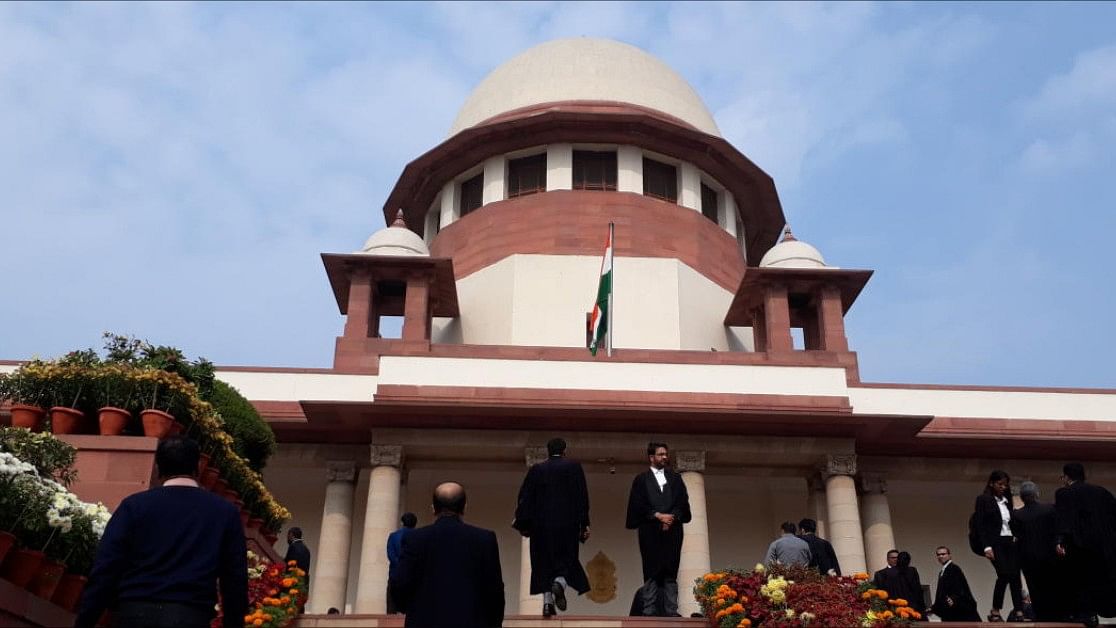
The Supreme Court of India.
Credit: iStock Photo
New Delhi: The Supreme Court on Wednesday restored acquittal of two men by setting aside the Karnataka High Court's judgment, holding them guilty for killing a property dealer in Bengaluru Rural in 2005.
A bench of Justices Sanjay Kumar and Aravind Kumar found the High Court by its cryptic observations reversed the judgment of acquittal; held the accused, Ramesh and Kumara guilty of the offences as charged and sentenced them to imprisonment for life.
"Surprisingly, despite the trial court detailing, at great length, the contradictions and discrepancies in their depositions, the High Court observed that the trial court had not pointed out any major contradictions which would discredit the evidence of prosecution witnesses one to three and the evidence of other witnesses," the bench said.
According to the High Court, the evidence adduced by the prosecution outweighed the findings recorded by the trial court, but no reasons worth the name were recorded by the High Court to support this conclusion, the bench said.
"The brusque approach of the High Court in dealing with the appeal, resulting in the conviction of appellant nos 1 and 2, reversing the cogent and well-considered judgment of acquittal by the trial court giving them the benefit of doubt, cannot be sustained," the bench said.
The court said once the trial court found no evidence to convict the accused, the burden was upon the High Court, while reversing the said judgment, to record clear findings in relation to each of the charges and, more particularly, the charge of criminal conspiracy under Section 120B IPC.
However, no such exercise was undertaken by the High Court, the bench said.
The court allowed the appeal filed by Ramesh and another person against the High Court's judgment of March 29, 2011.
It was alleged five accused hatched a criminal conspiracy to murder Babureddy and attacked him with deadly weapons on February 07, 2005 at about 7:30 AM. The attack took place near Hullahalli Gate Bus Stand in Bangalore Rural District. The deceased died en route to St John's hospital. As far as the motive was concerned, the prosecution alleged the accused had committed the offence as the deceased had failed to oblige them with their plea to cancel a land deal.
The bench noted the trial court duly took note of the discrepancies and contradictions in depositions of the witnesses.
In appeal, the bench said, the High Court merely summed up the depositions of the so-called eyewitnesses and baldly concluded that the presence of the eyewitnesses could not be doubted.
The court noted no explanation was offered by the police as to how they detected the whereabouts of auto rickshaw driver and the role played by him in the incident.
"The credibility of this witness was found to be highly suspect, given the delay in his surfacing and the contradictions in his evidence. If he was waiting near the bus stand, he would have himself witnessed the actual attack on the deceased, but he did not state so. He merely said that the accused returned ‘after half an hour’ with blood-stained clothes," the court said.
The court also noted none of the witnesses tried to intervene and rescue the deceased weighed with the trial court.
"Their conduct in not informing the police despite having mobile phones was also taken note of. The trial court noted that none of the witnesses had anything to say about the autorickshaw in which accused came," the bench said.
The court also found no effort was made to seize the clothes of these so-called eyewitnesses, which were stated to have been stained with the blood of the deceased while they were lifting him into the Maruti Van.
It said more damaging is the fact that the statements of the so-called eyewitnesses, were recorded under Section 161 CrPC one month after the date of the incident.
"This delay on the part of the Investigating Officer in recording their statements weighed heavily against the prosecution," the court pointed out.
It also noted even the motive attributed to the accused stood diluted as the Investigating Officer admitted that he had not obtained any record in proof of the deceased mediating the alleged sale transaction between Ramesh, accused number one and prosecution witness Narayanareddy.
"It was in these circumstances that the trial court held that the prosecution had failed to prove the guilt of the accused beyond reasonable doubt and extended the benefit of such doubt to them," the bench said.
